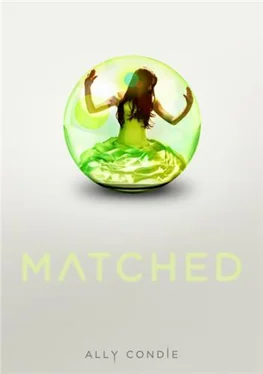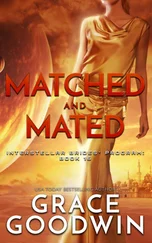Элли Конди - Matched
Здесь есть возможность читать онлайн «Элли Конди - Matched» весь текст электронной книги совершенно бесплатно (целиком полную версию без сокращений). В некоторых случаях можно слушать аудио, скачать через торрент в формате fb2 и присутствует краткое содержание. Жанр: Социально-психологическая фантастика, на английском языке. Описание произведения, (предисловие) а так же отзывы посетителей доступны на портале библиотеки ЛибКат.
- Название:Matched
- Автор:
- Жанр:
- Год:неизвестен
- ISBN:нет данных
- Рейтинг книги:3 / 5. Голосов: 1
-
Избранное:Добавить в избранное
- Отзывы:
-
Ваша оценка:
- 60
- 1
- 2
- 3
- 4
- 5
Matched: краткое содержание, описание и аннотация
Предлагаем к чтению аннотацию, описание, краткое содержание или предисловие (зависит от того, что написал сам автор книги «Matched»). Если вы не нашли необходимую информацию о книге — напишите в комментариях, мы постараемся отыскать её.
Matched — читать онлайн бесплатно полную книгу (весь текст) целиком
Ниже представлен текст книги, разбитый по страницам. Система сохранения места последней прочитанной страницы, позволяет с удобством читать онлайн бесплатно книгу «Matched», без необходимости каждый раз заново искать на чём Вы остановились. Поставьте закладку, и сможете в любой момент перейти на страницу, на которой закончили чтение.
Интервал:
Закладка:
"And I'm using the last hour to visit Grandfather." The Officials don't often allow a deviation from the usual free-rec options; but on the eve of someone's Final Banquet, visiting is encouraged and permitted.
My mother's eyes soften. "Hell love that."
"Did Papa tell Grandfather about my Match?"
My mother smiles. "He planned to stop by on his way to work."
"Good," I say, because I want Grandfather to know as soon as possible. I know he has been thinking as much about me and my Banquet as I've been thinking about him and his.
After I hurry and eat my breakfast, I make my train with seconds to spare and sit back. I may not have dreamed about Xander while I slept, but I can daydream about him now. Looking out the window and thinking about how he looked last night in his suit, I watch the Boroughs slide by on my way into the City. The green has not yet given way to stone and concrete when I notice white flakes drifting through the sky.
Everyone else notices them, too.
"Snow? In June?" the woman next to me asks.
"It can't be," a man across the aisle mutters.
"But look at it," she says.
"It can't be," the man says again. People twist, turn to the windows, looking agitated. Can something wrong be true?
Sure enough, little white puffs drift past on their way to the ground. There is something strange about this snow, but I'm not exactly sure what. I find myself holding in a smile as I look at all the worried faces around me. Should I be worried, too? Perhaps. But it's so pretty, so unexpected, and, for the moment, so unexplainable.
The air train comes to a stop. The doors open and a few pieces drift inside. I catch one on my hand, but it does not melt. The mystery of it does, however, when I see the little brown seed at the center of the snow.
"If s a cottonwood seed," I tell everyone confidently. "It's not snow."
"Of course," the man says, sounding glad to have an explanation. Snow in June would be atypical. Cottonwood seeds are not.
"But why are there so many?" another woman asks, still worried.
In a moment, we have our answer. One of the new passengers sitting down brushes white from his hair and plainclothes. "We're tearing out the cottonwood grove along the river," he explains. "The Society wants to plant some better trees there."
Everyone else takes his word for it; they know nothing about trees. They mutter about being glad it isn't a sign of another Warming; thank goodness the Society has things under control as usual. But thanks to my mother, who can't help talking about her work as a caretaker at the Arboretum, I know that his explanation does make sense. You can't use cottonwood trees for fruit or fuel. And their seeds are a nuisance. They fly far, catch on anything, try to grow everywhere. Weed trees, my mother says. Still, she harbors a particular affinity for them because of the seeds, which are small and brown but cloaked in beauty, in these thin white tendrils of cotton. Little cloudy parachutes to slow their fall, to help them fly, to catch the wind and glide them somewhere they might grow.
I look at the seed resting in the palm of my hand. There is still mystery in it after all, in that little brown core. I'm not sure what to do with it, so I tuck it into my pocket next to my tablet container.
The almost-snow reminds me of a line from a poem we studied this year in Language and Literacy: "Stopping by Woods on a Snowy Evening." It is one of my favorites of all the Hundred Poems, the ones our Society chose to keep, back when they decided our culture was too cluttered. They created commissions to choose the hundred best of everything: Hundred Songs, Hundred Paintings, Hundred Stories, Hundred Poems. The rest were eliminated. Gone forever. For the best, the Society said, and everyone believed because it made sense. How can we appreciate anything fully when overwhelmed with too much?
My own great-grandmother was one of the cultural historians who helped select the Hundred Poems almost seventy years ago. Grandfather has told me the story a thousand times, how his mother had to help decide which poems to keep and which to lose forever. She used to sing him parts of the poems as lullabies. She whispered, sang them, he said, and I tried to remember them after she had gone.
After she had gone. Tomorrow, my grandfather will go, too.
As we leave the last of the cottonwood seeds behind, I think about that poem and how much I like it. I like the words deep and sleep and the way they rhyme and repeat; I think to myself that this poem would be a good lullaby if you listened to the rhythm instead of the words. Because if you listened to the words you wouldn't feel rested: Miles to go before I sleep.
"If s a numbers sort today," my supervisor, Norah, tells me.
I sigh a little but Norah doesn't respond. She scans my card and hands it back. She doesn't ask about the Match Banquet, even though she has to know from my information update that it happened last night. But that's nothing new. Norah barely interacts with me because I'm one of the best sorters. In fact, it's been almost three months since my last error, which was the last time the two of us had a real conversation.
"Wait," Norah says as I turn toward my station. "Your scancard indicates that it's almost time for your formal sorting test."
I nod. I've been thinking about this for months; not as much as I thought about my Match Banquet, but often. Even though some of these number sorts are boring, sorting itself can lead to much more interesting work positions. Perhaps I could be a Restoration supervisor, like my father. When he was my age, his work activity was information sorting, too. And so was Grandfather's, and of course there is my great-grandmother, the one who participated in one of the greatest sortings of all when she was on the Hundred Committee.
The people who oversee the Matching also get their start in sorting, but I'm not interested in that. I like my stories and information one step removed; I don't want to be in charge of sorting real people.
"Make sure you're ready," Norah says, but both she and I know that I already am.
Yellow light slants through the windows near our stations in the sorting center. I cast a shadow across the other workers' stations as I pass by. No one looks up.
I slip into my tiny station, which is just wide enough for a table and a chair and a sorting screen. The thin gray walls rise up on either side of me and I can't see anyone else. We are like the microcards in the research library at Second School—each of us neatly tucked into a slot. The government has computers that can do sorts much faster than we can, of course, but we're still important. You never know when technology might fail.
That's what happened to the society before ours. Everyone had technology, too much of it, and the consequences were disastrous. Now, we have the basic technology we need—ports, readers, scribes—and our information intake is much more specific. Nutrition specialists don't need to know how to program air trains, for example, and programmers, in turn, don't need to know how to prepare food. Such specialization keeps people from becoming overwhelmed. We don't need to understand everything. And, as the Society reminds us, there's a difference between knowledge and technology. Knowledge doesn't fail us.
I slide my scancard and the sort begins. Even though I like word association or picture or sentence sorts the best, I'm good at the number ones, too. The screen tells me what patterns I'm supposed to find and the numbers begin to scroll up on the screen, like little white soldiers on a black field waiting for me to mow them down. I touch each one and begin to sort them out, pulling them aside into different boxes. The tapping of my fingers makes a low, soft sound, almost as silent as snow falling.
Читать дальшеИнтервал:
Закладка:
Похожие книги на «Matched»
Представляем Вашему вниманию похожие книги на «Matched» списком для выбора. Мы отобрали схожую по названию и смыслу литературу в надежде предоставить читателям больше вариантов отыскать новые, интересные, ещё непрочитанные произведения.
Обсуждение, отзывы о книге «Matched» и просто собственные мнения читателей. Оставьте ваши комментарии, напишите, что Вы думаете о произведении, его смысле или главных героях. Укажите что конкретно понравилось, а что нет, и почему Вы так считаете.












